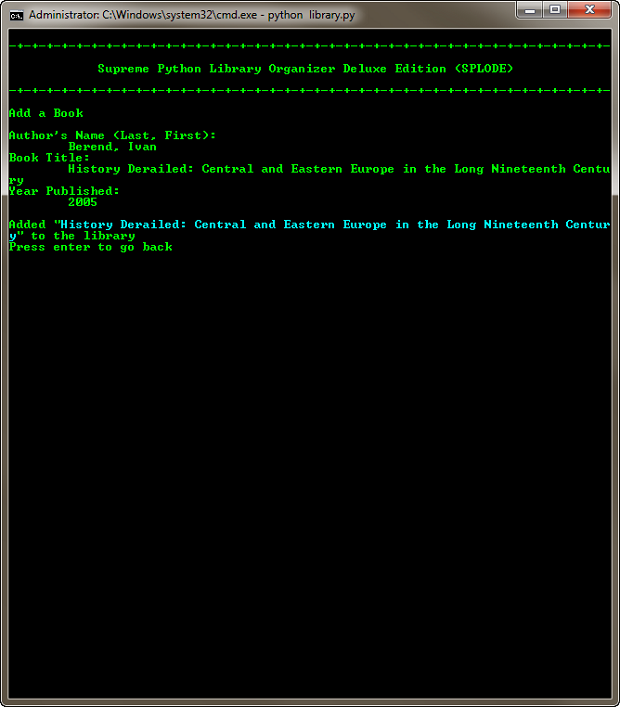Quick Library Maker
staving off boredom with organizationPreface
We’ve had an unprecedented number of snow days lately, including today, and I’ve been terrible at being productive during them. It’s just so easy to do absolutely nothing when the city is telling you to stay indoors. Last night, when I should have been reading or writing or doing something school-related, I instead figured I’d code something, just for funsies.
I have a lot of books. Like, thousands of dollars worth between Katie and myself. I’ve toyed around with making a library-type system before with php and mysql, but that’s harder than it should be and you have to run it on a server, and it’s all a little cumbersome. Granted, it comes with extra functionality, but I wanted to do something simple.
The Beginning
I wanted a small program that could add things to a list, sort that list, and then display the list. This isn’t a hard thing, and I barely had to look anything up (yay!), but that didn’t help me from starting things off all wrong.
The first thing I wrote was a simple options list. I did this at first with a bunch of if statements. This was not the thing to do, as nesting ifs together gets cumbersome and trying to link between them is downright stupid. And wrong. (Though I suppose if python had a GOTO command, that could work. But it doesn’t. Because GOTO isn’t pythonic.)
topmenu = "\t1. View Contents\n\t2. Add an Item\n\t3. Exit"
print("Select an option\n" + topmenu)
select = input("\n\t# ")
if select == "1":
#do all the view library stuff
#find a way to go back to the start?
elif select == "2":
#do all the add an item stuff, which includes choosing between books and movies
#some more nested ifs
#again, get back to the start?
elif select == "3":
quit
So I revised when I remembered that functions are so the way to go.
Functions, Not GOTO
Once I started with functions, I decided to go functions all the way, because why not, right? Besides, it’s always fun to have the entire programmy part of the program be one line. So this is what I ended up with:
def libload():
if os.path.exists(".booklib.txt"):
with open(".booklib.txt", "r") as bf:
booklib = [line.strip() for line in bf]
booklib.sort()
global booklib
else:
booklib = []
global booklib
if os.path.exists(".movielib.txt"):
with open(".movielib.txt", "r") as mf:
movielib = [line.strip() for line in mf]
movielib.sort()
global movielib
else:
movielib = []
global movielib
def startup():
libload()
os.system("cls")
topmenu = "\t1. View Contents\n\t2. Add an Item\n\t3. Exit"
print("Select an option\n" + topmenu)
select = input("\n\t# ")
if select == "1":
viewlib()
elif select == "2":
addstart()
elif select == "3":
quit
else:
input("\nTry again. Hit enter.")
startup()
def viewlib():
os.system("cls")
print("\nView the Library\n")
date = datetime.datetime.now()
stamp = date.strftime("%Y%m%d-%H%M")
fname = "Library-" + stamp + ".txt"
f = open(fname, 'w')
f.write("Books:\n")
for item in booklib:
f.write("%s\n" % item)
f.write("\nMovies:\n")
for item in movielib:
f.write("%s\n" % item)
f.close()
print("File " + fname + " created.")
webbrowser.open(fname)
input("Press enter to return.")
startup()
def addstart():
os.system("cls")
print("\nAdd an Item\n\t1. Book\n\t2. Movie\n")
addsel = input("\t# ")
if addsel == "1":
addbook()
elif addsel == "2":
addmovie()
else:
startup()
def addbook():
os.system("cls")
print(header + "\nAdd a Book\n")
bauthor = input("Author's Name (Last, First):\n\t")
btitle = input("Book Title:\n\t")
byear = input("Year Published:\n\t")
addb = [bauthor, btitle, byear]
booklib.append(addb)
with open(".booklib.txt", "w") as ab:
for item in booklib:
ab.write("%s\n" % item)
print("\nAdded \"" + btitle + "\" to the library")
input("Press enter to go back")
startup()
def addmovie():
os.system("cls")
print(header + "\nAdd a Movie\n")
mtitle = input("Movie Title:\n\t")
myear = input("Year Released:\n\t")
addm = [mtitle, myear]
movielib.append(addm)
with open(".movielib.txt", "w") as am:
for item in movielib:
am.write("%s\n" % item)
print("\nAdded \"" + mtitle + "\" to the library")
input("Press enter to go back")
startup()
startup()
Some Notes on the Above
There are a few things up in there that tricked me. First of all was needing to use the global so I could access the variables booklib and movielib in other functions. It wasn’t that I wasn’t sure I needed global, but it was just how to use it correctly, since I really haven’t had to mess with it that much.
There was also the issue of sorting these lists. Hot damn, that was messing me up. I was trying to sort booklib and movielib all over the place until I realized that if I turned the opening of the libraries into a function that fired at the beginning of startup() I could do all the sorting in one place. The only problem I forsee with this is when there are hundreds of entries in each file, opening, sorting, and closing it every time I go back to the first screen could get reeeeeeeally slow. But for now, it’s fine.
Appearances
With the meat of the code functional, I wanted to make it look alright. I googled around to figure out how to resize a console window, which turned out to be super easy:
import os
os.system("mode con cols=81 lines=60")
Then I pulled Colorama in, which I used in the Roll programs, to put some colors in. It’s by no means fantastic-looking, but it’s better than white-on-black I suppose. I also gave it a fancycool name: SPLODE. Here’s a screenshot after an item was added (yes, I know there’s a lot of unused space in that window…):
Get It
You can find a copy of the whole of library.py at its home on github. As always, tweet me up @thunderchao if you have any comments or questions.
PS
Yeah, I know my last post was in August 2012. Whoops. The demands and pressures of starting a PhD program I suppose.

